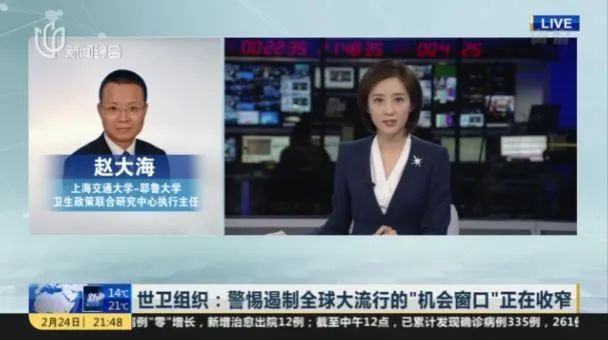上海交大赵大海接受上海电视台新闻综合频道采访:各国应抓住“机会之窗”,全力以赴扑灭新冠疫情

上海交通大学国际与公共事务学院博士生导师、上海交通大学-耶鲁大学卫生政策联合研究中心执行主任赵大海,近日接受上海电视台新闻综合频道的直播连线采访。在2020年2月24日晚九点半的《新闻夜线》节目,赵大海就有关世界各国新冠肺炎防控情况、世界卫生组织所提“机会之窗”正在缩小,以及如何延长“机会之窗”和各国疫情趋势等进行了直播评论。现将有关评论内容摘录如下。
主持人:从目前来看,您认为各国对新冠肺炎的处置情况是怎样的?
赵大海:各国对新冠肺炎的重视程度和处置情况还是有差异的。意大利和韩国已出台严格防控措施。譬如,韩国在2月23日将新冠肺炎疫情预警上调至最高级别“严重”;意大利在2月22号宣布将北部的12个市镇封城隔离,任何人如果没有特别许可都不能擅自进出该地区。对于其他国家而言,日本已在全国动员,宣称全国新冠肺炎疫情已经进入过渡期,但具体的防控措施目前还没有正式的公布。新加坡、泰国等新冠肺炎确诊病例数较多的国家还没有出台相对严格的防控措施。
主持人:世卫组织称防控的“机会之窗”正在缩小,这意味着什么?
赵大海:世卫组织宣称:目前全球范围内仍然有机会控制病毒,但机会之窗正在缩小;而之所以提出这句话的主要依据是:新冠病毒在中国以外的国家以及与中国或武汉没有直接关联的人群中已开始传播。世卫组织最担心的是新冠肺炎病毒传播到医疗卫生系统薄弱的非洲等国家,这将会带来重大的灾难。因此,要抓住这个机会之窗,也就是说还没有传播到非洲等医疗卫生系统、公共卫生系统薄弱的国家的时候,尽快遏制疫情扩散。
主持人:您认为延长机会窗口的办法有哪些?
赵大海:对于日本、韩国、意大利等疫情已比较严重的国家,应该采取最为严格的措施来防控新冠肺炎;具体就是“既要防输入,又要防扩散”;以城市为单位,加强对所有外来人员的体温等检查和两周隔离;对确诊患者的密切接触者进行隔离。而对于其他大多数国家,可以主要通过严防输入,按照国家为单位,对所有外来人员都要进行体温等检查并且隔离。
主持人:您认为疫情后续趋势会怎样?
赵大海:如果世界各国都高度重视新冠肺炎,能把握住机会窗口,而且采取严格的防输入、严格对于外来人员进行两周隔离或者既防输入又防扩散的策略,疫情在全世界是可以很快得到控制的。但前提条件是各国都高度重视新冠肺炎疫情,而且采取严格措施。
供稿单位:国际与公共事务学院
日期:2020年02月25日
Dahai Zhao, Executive Director of SJTU-Yale Joint Center for Health Policy was Interviewed by Shanghai TV News Channel: Countries should Seize Window of Opportunity, and Make Every Effort to Containing COVID-19
In the "Night News" program at 9:30 pm on February 24, 2020, Zhao made live comments on the prevention and control of COVID-19 in various countries, the "window of opportunity" proposed by the WHO are shrinking, and how to extend the "window of opportunity" and outbreak in various countries. The relevant commentary content is excerpted as follows.
Anchor: What do you think of the treatment of COVID-19 in various countries?
Zhao: The treatment of COVID-19 varies from country to country. Italy and South Korea have introduced strict prevention and control measures. For example, South Korea raised COVID-19 epidemic alert to the highest level on February 23. Italy announced that 12 northern towns would be closed and isolated on February 22. No one can enter or leave the area without special permission. For other countries, Japan has mobilized throughout the country, claiming that the national epidemic has entered a transition period, but specific prevention and control measures have not yet been officially announced. Countries with a high number of confirmed cases, such as Singapore and Thailand, have not introduced strict prevention and control measures yet.
Anchor: WHO said the "window of opportunity" for prevention and control is shrinking. What do you think?
Zhao: WHO said there was still a global window of opportunity to contain the virus, but the window of opportunity is shrinking. The main reason is that COVID-19 has begun to spread among people who did not directly relate to China or Wuhan. Therefore, we need to seize this window of opportunity, that is, to stop the spread as soon as possible before it reaches countries with weak health and public health systems, such as Africa.
Anchor: What do you think are the ways to extend the window of opportunity?
Zhao: For Japan, South Korea, Italy and other countries with severe epidemic, the most stringent measures should be taken to prevent and control COVID-19. Specifically, it is necessary to "both prevent import and prevent proliferation". Take the city as the unit, strengthen the examination of the temperature and and two weeks of isolation to all outsiders. Isolate close contacts of confirmed patients. For most other countries, it can be mainly through strict prevention of imports, according to the country as a unit, all outsiders should be subject to temperature check and other quarantine.
Anchor: What do you think will happen next?
Zhao: If all countries in the world attach great importance to the COVID-19, grasp the window of opportunity, and adopt the strategy of strict import prevention and two-week isolation for outsiders, the epidemic situation in the world can be quickly controlled. But the precondition is that all countries should attach great importance to the outbreak of COVID-19 and take strict strategies of both input and proliferation prevention.
Contributor: SJTU School of International and Public Affairs
Data: February 25, 2020

